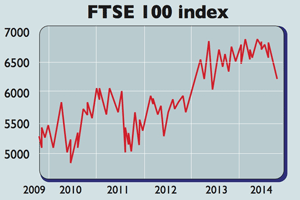It’s time for stockmarkets to go into rehab
Stockmarkets are struggling to ween themselves off central bank money-printing.

Get the latest financial news, insights and expert analysis from our award-winning MoneyWeek team, to help you understand what really matters when it comes to your finances.
You are now subscribed
Your newsletter sign-up was successful
Want to add more newsletters?

Twice daily
MoneyWeek
Get the latest financial news, insights and expert analysis from our award-winning MoneyWeek team, to help you understand what really matters when it comes to your finances.

Four times a week
Look After My Bills
Sign up to our free money-saving newsletter, filled with the latest news and expert advice to help you find the best tips and deals for managing your bills. Start saving today!
"Markets need to check into the Betty Ford Center and go into rehab, to wean themselves off this addiction to central bank support," says Adrian Miller of GMP Securities.
Last week the S&P 500 saw its worst three-day drop since 2011, and hit six-month lows. European and UK stockmarkets (see chart) slid to their lowest levels in over a year.
But on Friday markets perked up as central bankers made soothing noises. The Bank of England's (BoE) Andy Haldane said the BoE could keep interest rates lower for longer than previously anticipated.
MoneyWeek
Subscribe to MoneyWeek today and get your first six magazine issues absolutely FREE

Sign up to Money Morning
Don't miss the latest investment and personal finances news, market analysis, plus money-saving tips with our free twice-daily newsletter
Don't miss the latest investment and personal finances news, market analysis, plus money-saving tips with our free twice-daily newsletter
In America, Federal Reserve member James Bullard said the US central bank should continue with its quantitative-easing (QE), or money-printing, programme rather than wind it up in October.
For five years now policymakers have "pumped up asset prices to buy time for a lasting recovery", says Philip Aldrick in The Times.
Zero interest rates and injections of printed money led to an unprecedented liquidity boost for markets. So much so that bad data often boosted stocks, as they implied further money printing and another wave of cash reaching equity markets.
Now that the UK and US economies are improving, interest rates should rise. But markets have relied on central-bank liquidity for so long, "like a small child holding his dad's hand when learning to ride the bike", that they are scared to go without, says The Economist's Buttonwood blog. "It is time to let go of the hand now, but there will be bumps and bruises along the way."

But investors hoping for more QE shouldn't expect the UK and US to turn on the taps again in the near future.
For one thing, not all members of each central bank are behind the idea. And with both economies improving, central banks should surely keep their powder dry for a major economic shock such as another eurozone crisis rearing up, perhaps.
If and when that happens, markets might finally lose faith in central banks' stimulus measures and realise they aren't omnipotent, says Gavyn Davies in the Financial Times.In which case, markets will "have entered much more dangerous waters".
Get the latest financial news, insights and expert analysis from our award-winning MoneyWeek team, to help you understand what really matters when it comes to your finances.

-
 Should you buy an active ETF?
Should you buy an active ETF?ETFs are often mischaracterised as passive products, but they can be a convenient way to add active management to your portfolio
-
 Power up your pension before 5 April – easy ways to save before the tax year end
Power up your pension before 5 April – easy ways to save before the tax year endWith the end of the tax year looming, pension savers currently have a window to review and maximise what’s going into their retirement funds – we look at how